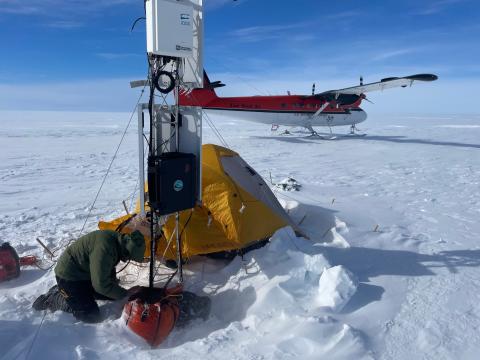
Remote and unpopulated, Antarctica and its surrounding waters are the focal points of worldwide scientific study concerning climate change. Chris Kratt ’02 just returned from several weeks’ research on the southern continent’s Florida-sized Thwaites Glacier, which is weakening due to warming temperature and has been predicted to make a major contribution to sea level rise during the next century.
A teaching faculty member, researcher, and environmental monitoring program coordinator with University of Nevada, Reno, Kratt deploys precision geoscience instrumentation in technically challenging field settings, combining the skills and techniques he learned at Plymouth State with an affinity for outdoor adventure.
Kratt came to PSU with many memorable experiences already under his belt, including work with a rally racecar team, renovations atop the Old Man of the Mountain, Marine Corps service, mountain guiding on Mount Shasta, ski and avalanche patrolling in Tahoe, and leading a 40-day trip in Alaska. A geography course at a California community college became an aha moment that helped reconnect him to his Granite State roots.
“Growing up in Littleton gave me the opportunity to do a lot of skiing and hiking,” Kratt recalls. He returned home and studied geography at Plymouth State at a time when Geographic Information Systems (GIS) were transforming the field. “The remote sensing and air photo interpretation class got me really excited, and when I took Geology 101, I felt, ‘Wow!’ I had experienced a lot of these different mountains and places personally.”

Kratt at a research station in Antarctica.
“It was fantastic to work with Dr. Bryon Middlekauff and Dr. Larry Spencer,” Kratt continues, referring to two of his professors who are now faculty emeriti. “They had a lot of influence on my interests, mainly remote sensing work.” Kratt plunged into campus life as president of the Geography Club while grooming Cannon Mountain trails at night.
Kratt found relevant summer employment with a Lakes Region groundwater firm after he mentioned to a faculty member that he was looking for some field experience. “You can do a lot with a small school because of the personal relationships that you develop, and it’s so easy to talk with your instructors,” he notes.
After earning his BS in geography with an earth science minor, he went on to the University of Nevada, Reno for master’s studies. Today, he teaches and coordinates the university’s Center for Transformative Environmental Monitoring Programs, which provides field-deployable, high-precision instruments including drones, sensors, and fiber optic temperature measurement systems for both commercial and non-commercial use.
Kratt’s recent Antarctic research is part of the International Thwaites Glacier Collaboration. He was part of a team that collected data concerning a significant phenomenon in which glacial retreat is exposing more ice surface area to warm ocean water.
“Global warming and changes in ocean circulation patterns are causing more rapid rates of melting ice down there,” says Kratt. “The glacier is grounded on pinning points, and as it becomes less and less grounded, at high tide warmer water can flow through the gap, which can lead to more rapid collapse. We’re working on quantifying the potential large-scale changes in sea level rise through predictive models.”
Currently teaching back in Reno, Kratt is already looking ahead to the fall, when he’ll travel to the Philippines to fly a thermal mapping mission. It just might be the focus of another one of his well-received Plymouth State alumni presentations.

